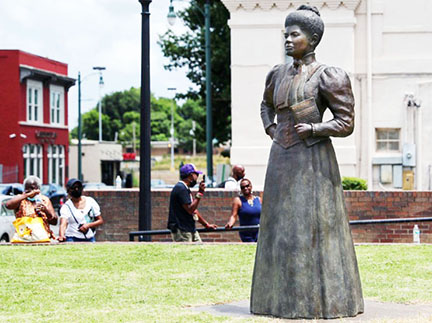By Lynn Norment
MEMPHIS, TN — It was a jubilant day in Memphis – a time of celebrating the life and legacy of Ida B. Wells and the unveiling of a statue honoring the courageous journalist, educator, civil rights leader and suffragist.
Several hundred people on July 16 gathered at Beale and Fourth streets in downtown Memphis, where the life-sized bronze

Tiana Ferrell (2nd left), and Michelle Duster (right). Photos by Lynn Norment
statue was erected at Ida B. Wells Plaza adjacent to Beale Street Baptist Church. In the basement of the historic church from 1889 to early 1890s, Wells published the Free Speech and Headlight newspaper.
Wells’ great-granddaughter and two great-grandsons were present for the unveiling. Among the dignitaries speaking in the celebratory event were Tennessee Congressman Steve Cohen, Memphis Mayor Jim Strickland, Shelby Country Major Lee Harris, Holly Springs, Miss., Mayor Sharon Gipson, SCLC President Charles Steele.
The Memphis Memorial Committee, chaired by Dr. L. LaSimba Gray, a retired pastor and community activist, partnered with the Neshoba Community Resource Center to create the event. The committee raised $250,000 from donors.
The birthday celebration kicked off with a parade on Beale Street. David and Yvonne Acey, community activists who founded the annual Africa in April Festival, led the procession with an Ida B. Wells banner.

celebration; righthand photo, A new statue of Ida B. Wells
was unvieled. Photos by Lynn Norment
It was a fitting celebration for the 159th birthday of Wells, who was born into slavery in Holly Springs, Mississippi, in 1862, and died in 1931 in Chicago. Her father, a trained builder and carpenter, became a respected leader in Holly Springs. He helped found Rust College, where Ida studied. When she was 16, her parents and baby brother died during a cholera epidemic. To keep her siblings together, Ida became a teacher. A few years later, she moved her family to Memphis to live with an aunt and taught at Memphis public schools.
Young Ida’s reputation for feistiness and rebellion might have begun when she was kicked out of Rust College due to a disagreement with the school’s president. That spunk persisted as she continued her education at Fisk University in Nashville. At one time she purchased a first-class train ticket to Nashville but was thrown off after refusing to give up her seat to a White woman.
While teaching, Wells constantly protested injustices in the school system and eventually began a partnership with the owner of the Free Speech and Headlight. As the newspaper became successful, she evolved into a full-time journalist/publisher and devoted her time to writing about lynching and other wrongs against Blacks.
When three of her friends who owned a grocery store were lynched by a white mob, Wells exposed the tragedy in her newspaper. She was out of town when the newspaper was destroyed and threats made against her life.
Wells did not return to Memphis but continued to investigate and write about injustices. She traveled across the country and to Europe on an anti-lynching crusade. In 1895, she published the Red Record, a statistical analysis of lynching. Eventually she married Chicago attorney F.L. Barnett, also a newspaper editor. Wells eventually became owner. In 1905, she was part of a group that founded the Niagara Movement, predecessor to the NAACP.
Ida B. Wells was most deserving when in 2020 she was awarded a Pulitzer Prize special citation “for her outstanding and courageous reporting on the horrific and vicious violence against African Americans during the era of lynching.” Last month, a monument was erected in her honor in Chicago, which already had named a major thoroughfare for her.
At the unveiling ceremony in Memphis, event chair Dr. LaSimba Gray said he hopes people will revere Wells’ service to uplift humanity. “I hope people see that statue and be inspired to do what she did,” he said. “She fought tyranny. She fought racism. She fought injustice wherever she saw it.”
Wells’ great-granddaughter Michelle Duster reminded the crowd that African Americans have a rich history of resistance and excellence that many times is faced with hostility and denial. “My great grandmother faced it, and unfortunately, 90 years after she died, we are still facing it,” said Duster, who has a new book, Ida B. the Queen: The Extraordinary Life and Legacy of Ida B. Wells.
“Some people don’t want our stories, our realities, our perspectives to be told, heard or acknowledged. But in the spirit of Ida B. Wells, we will not be silenced. We will not be marginalized. We will not allow our truths, our stories, our experiences to be minimized or erased.”



